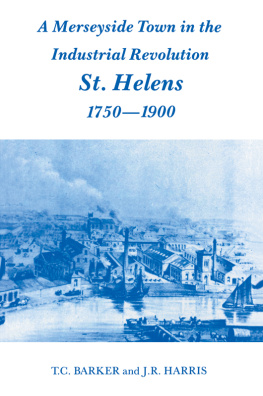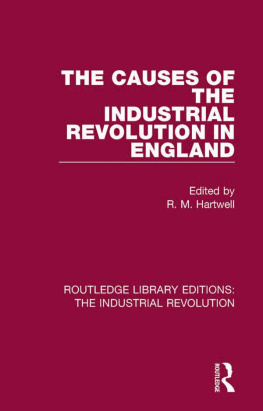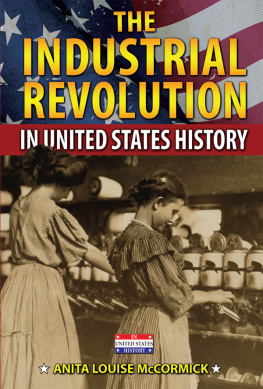Copyright 2013 Emma Griffin
All rights reserved. This book may not be reproduced in whole or in part, in any form (beyond that copying permitted by Sections 107 and 108 of the U.S. Copyright Law and except by reviewers for the public press) without written permission from the publishers.
For information about this and other Yale University Press publications, please contact:
U.S. Office:
Europe Office:
Set in Adobe Caslon Pro by IDSUK (DataConnection) Ltd
Printed in Great Britain by TJ International Ltd, Padstow, Cornwall
Library of Congress Cataloging-in-Publication Data
Griffin, Emma.
Libertys dawn: a peoples history of the Industrial Revolution/Emma Griffin.
pages cm
ISBN978-0-300-15180-0 (hardback)
1. Industrial revolutionGreat Britain. 2. Great BritainSocial conditions. 3. Great BritainEconomic conditions. I. Title.
HC253.G75 2013
330.94107dc23
2012050618
A catalogue record for this book is available from the British Library.
10 9 8 7 6 5 4 3 2 1
For David, Benedict and Anna
An ample theme: the intense interests, passions, and strategy that throb through the commonest lives.
Thomas Hardy, The Life and Work of Thomas Hardy, ed. Michael Millgate (London, 1884), p. 158
The most remarkable century ever known in the history of the World, for progress in Education, inventions, Engineering, Electricity, Farming, everything tending to the betterment of the Nation and the Welfare of the People and making life worth living.
Richard Cook, p. 26, Lincoln Reference Library
A CKNOWLEDGEMENTS
M ANY FRIENDS AND colleagues have been kind enough to offer advice and criticism on this project at various stages. I would like to thank Silvia Evangelisti, Tim Hitchcock, Jane Humphries, Gareth Stedman Jones and Leigh Shaw-Taylor for discussing this project. I am particularly grateful to Gregory Claeys, David Craig, Christopher Ferguson, John Hatcher, Richard Huzzey, Jo Innes, Steve King, Peter Mandler, Sarah Pearsall, Heather Savigny, Anne Secord, Patrick Wallis and Andy Wood for reading and commenting on work in progress. Carolyn Steedman let me read her work on Joseph Woolley and that and the communications that followed have been of immense value. Robert Poole has helped me out with queries about Samuel Bamford, and Christopher Ferguson has set me straight on points of detail concerning James Carter. I am grateful to all for countless corrections and for helping me to improve my argument and expression in significant ways.
I have had the opportunity to present ideas to seminar audiences at the Cambridge Group for Population History; the Local Population Studies Society; Robinson College, Cambridge; Southampton University; Gonville and Caius College, Cambridge; the Institute of Historical Research, London; All Souls College, Oxford; and St Annes College, Oxford. I must thank the organisers of these events for their invitations and the audiences for invaluable criticism, advice and encouragement. What follows is certainly the better for its engagement with so many critical listeners.
The actual completion of this book was made possible only by a research fellowship from the Arts and Humanity Research Council and a years study leave from the University of East Anglia. My thanks are due to both institutions for these much valued periods of research leave.
My greatest debt goes to my husband, David Milne, who discussed the big ideas of the project and pored over the smallest details of countless draft chapters, all the while sharing equally in the running of a home and the raising of our two small children. This book is dedicated with love and gratitude to David, Benedict and Anna.
CHAPTER ONE
Introduction: A Simple Naritive
A T THE DAWN of the nineteenth century, a subtle and little-noticed social change began to take place in Britain. As the industrial revolution picked up pace, a growing number of ordinary working people picked up pen and paper and wrote down their memories. Some, such as the poet Robert Anderson, overcame impoverished origins to acquire considerable literary skills. His Memoirs of the author were published in 1820 as a preface to a volume of his poetry. Regardless of literary merit, these writers bequeathed an extraordinary collection of historical sources, hundreds of evocative tales of everyday life during one of the most momentous transitions in world history. This book tells their story, an unexpected tale of working people carving out for themselves new levels of wealth, freedom and autonomy. Let us begin by opening the pages of one such notebook.
In the vaults of the Norfolk Record Office lie the memoirs of John Lincoln. Written in the 1830s, the memoirs were carefully passed through his descendants from one generation to the next until they reached the local historian, Patrick Palgrave-Moore, who wisely deposited them for safe keeping at the Record Office. The eighty pages of Lincolns notebook are fragile and torn, filled with the untidy hand of a self-taught writer. The closely written, margin-less pages remind us that Lincoln lived at a time when paper was a precious commodity. They comprised what he called his simple Naritive, a detailed account of his life from his earliest childhood recollections to the present. Lincoln was nearly sixty when he wrote his memoirs. He is not listed in the
From his notebook, we learn that John was born into a life of crushing poverty, even by the depressed standards of the late eighteenth century. His father died shortly after his birth, leaving his mother destitute. To keep her small family of two children together (down from the ten she had given birth to), Johns mother would go a washing 5 days in the week.
Perhaps these traumatic experiences help explain the unsatisfactory relationships he entered soon after. His first was with Ann, a fellow servant at Oxborough, an excellent cook but a woman with a hot and Violent Temper she was a very stout person and ten years older than myself.
The seasons rolled by, with John constantly shifting from one employer to the next. In his memoirs, John made a careful note of each of his employments and the petty fallings-out that had terminated many, but did not touch again upon personal matters until he formed an acquaintance with a young woman while working in Brandon. Unable to persuade her otherwise, John moved on, first to Wimblington to work at the plough, and then into Essex, ending up finally at the Royal Arsenal at Woolwich where for a number of years he enjoyed plenty of work at good wages, thanks to the governments insatiable need for munitions triggered by the wars with Napoleons France.
It was at Woolwich that Lincoln once more began to think of trying another partner for life here was plenty of Choice. And despite the care with which John described his own childhood and entry to the workforce he wrote very little about his children and nothing about when and why they started work. After his marriage, Johns memoirs wandered on to other themes his struggle to find employment following the downscaling of operations at the Royal Artillery and, above all, his religious conversion. He returned to family matters only sporadically and inconsistently.















